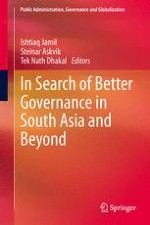2013 | OriginalPaper | Chapter
Citizens’ Trust in Public Officials: Bangladesh and Nepal Compared
Authors : Ishtiaq Jamil, Steinar Askvik
Published in: In Search of Better Governance in South Asia and Beyond
Publisher: Springer New York
Activate our intelligent search to find suitable subject content or patents.
Select sections of text to find matching patents with Artificial Intelligence. powered by
Select sections of text to find additional relevant content using AI-assisted search. powered by
